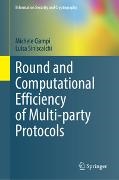Share
Fr. 238.00
Michele Ciampi, Luisa Siniscalchi
Round and Computational Efficiency of Multi-party Protocols
English · Hardback
Will be released 14.08.2025
Description
Cryptographic protocols are the backbone of secure digital interactions, but achieving both security and efficiency is a challenging balancing act. The challenge is how to minimize computational costs and reduce interaction while maintaining provable security. This book explores cutting-edge techniques to optimize cryptographic protocols under well-established assumptions.
The monograph focuses on secure multi-party computation, non-malleable commitments, and proof systems, presenting new constructions based on general and standard cryptographic assumptions.
Topics and features:
- First optimal-round two-party computation protocol: introduces the first secure, two-party computation protocol (and multi-party protocol for coin-tossing) with black-box simulation under standard assumptions, achieving optimal round complexity in the simultaneous message exchange model
- Breakthrough in non-malleable commitments: develops the first four-round, concurrent, non-malleable commitment scheme based on one-way functions and a three-round variant under stronger (still general and standard) assumptions
- Advances in zero-knowledge proofs: non-interactive, Zero-Knowledge proof systems that improve both efficiency and generality, enhancing practical applicability in cryptographic protocols
- Efficient witness-indistinguishable proof systems: three-round, witness-indistinguishable proof systems with a novel delayed-input property, with application to interactive zero-knowledge
List of contents
Part I, Preliminaries.- 1 Introduction.- 2 Preliminaries.- Part II, Secure Two-Party Computation.- Round Optimal 2-Party Computation.- Private Set-Membership in the Semi-honest Setting.- Part III, Non-malleable Primitives.- Three-Round Non-malleable Commitment.- Delayed-Input Non-malleable Zero Knowledge.- Four-Round Concurrent Non-malleable Commitments from One-Way Functions.- Part IV, Efficient Proof Systems.- Improved OR Composition.- Delayed-Input Witness Indistinguishable Proofs of Knowledge.- Non-interactive Zero-Knowledge Without Programmable Random Oracles.
About the author
Michele Ciampi received his PhD from the University of Salerno. His supervisor was Giuseppe Persiano, the externals were Michel Abdalla and Berry Schoenmakers. He has since worked in the groups of Ivan Visconti, Rafail Ostrovsky, Ivan Damgaard and Claudio Orlandi. He is a researcher in the School of Informatics of the University of Edinburgh.
Luisa Siniscalchi received her PhD from the University of Salerno. Her PhD supervisor was Ivan Visconti, the externals were Sanjam Garg and Yuval Ishai. She has since worked in the groups of Ivan Visconti, Rafail Ostrovsky, Ivan Damgaard and Claudio Orlandi. She now works in the Concordium Blockchain Research Center in Aarhus.
Summary
Cryptographic protocols are the backbone of secure digital interactions, but achieving both security and efficiency is a challenging balancing act. The challenge is how to minimize computational costs and reduce interaction while maintaining provable security. This book explores cutting-edge techniques to optimize cryptographic protocols under well-established assumptions.
The monograph focuses on secure multi-party computation, non-malleable commitments, and proof systems, presenting new constructions based on general and standard cryptographic assumptions.
Topics and features:
- First optimal-round two-party computation protocol: introduces the first secure, two-party computation protocol (and multi-party protocol for coin-tossing) with black-box simulation under standard assumptions, achieving optimal round complexity in the simultaneous message exchange model
- Breakthrough in non-malleable commitments: develops the first four-round, concurrent, non-malleable commitment scheme based on one-way functions and a three-round variant under stronger (still general and standard) assumptions
- Advances in zero-knowledge proofs: non-interactive, Zero-Knowledge proof systems that improve both efficiency and generality, enhancing practical applicability in cryptographic protocols
- Efficient witness-indistinguishable proof systems: three-round, witness-indistinguishable proof systems with a novel delayed-input property, with application to interactive zero-knowledge
Product details
| Authors | Michele Ciampi, Luisa Siniscalchi |
| Publisher | Springer, Berlin |
| Languages | English |
| Product format | Hardback |
| Release | 14.08.2025 |
| EAN | 9783031923739 |
| ISBN | 978-3-0-3192373-9 |
| No. of pages | 289 |
| Illustrations | XIII, 289 p. 25 illus. |
| Series |
Information Security and Cryptography |
| Subjects |
Natural sciences, medicine, IT, technology
> IT, data processing
> IT
Kryptografie, Verschlüsselungstechnologie, cryptography, Cryptology, Cryptographic Protocol, Zero-Knowledge Proof Systems, Multi-party Computation, Non-malleable Primitives |
Customer reviews
No reviews have been written for this item yet. Write the first review and be helpful to other users when they decide on a purchase.
Write a review
Thumbs up or thumbs down? Write your own review.

